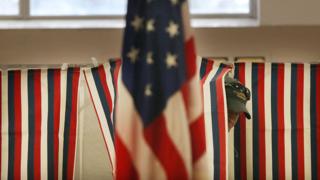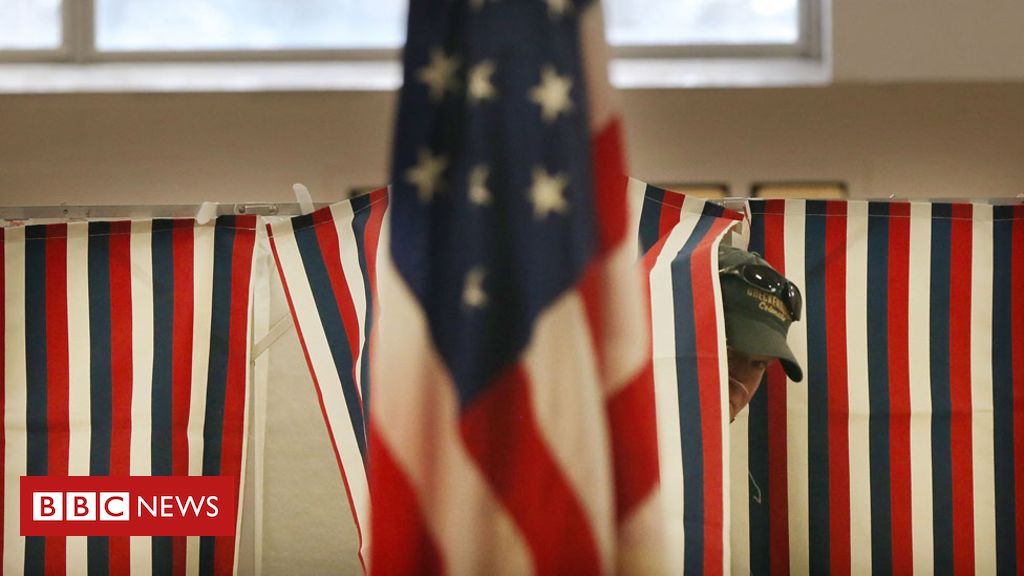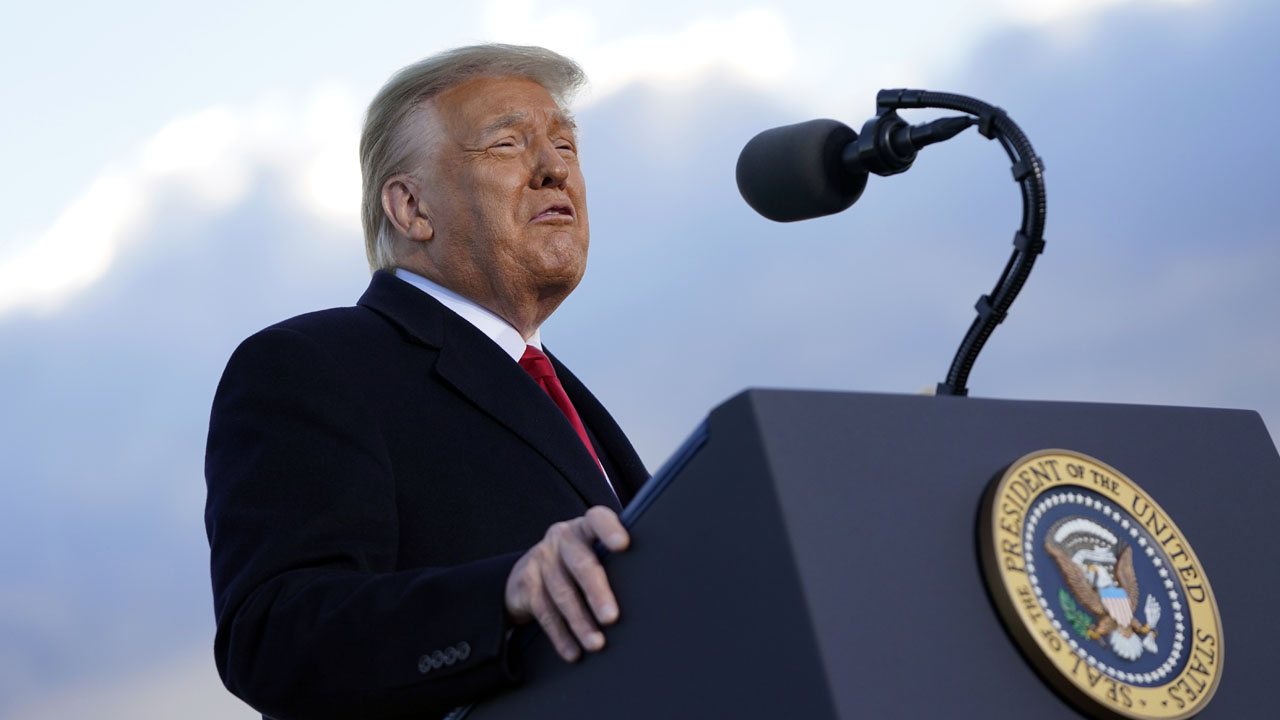 Image copyright
Image copyright
Getty Images
As the coronavirus pandemic grinds much of the US economy to a halt, it is also playing havoc with the American democratic process during a national election year.
Primary contests have been delayed or disrupted, with in-person polling places closed and absentee balloting processes thrown into doubt. Politicians have engaged in contentious fights over the electoral process in legislatures and the courts.
In November voters are scheduled to head to the polls to select the next president, much of Congress and thousands of state-government candidates. But what could Election Day look like – or if it will even be held on schedule – is very much the subject of debate.
Here are answers to some key questions.
Could President Trump postpone the election?
A total of 15 states have delayed their presidential primaries at this point, with most pushing them back until at least June. That presents the pressing question of whether the presidential election in November itself could be delayed.
Under a law dating back to 1845, the US presidential election is slated for the Tuesday after the first Monday of November every four years – 3 November in 2020. It would take an act of Congress – approved by majorities in the Democrat-controlled House of Representatives and the Republican-controlled Senate – to change that.
The prospect of a bipartisan legislative consensus signing off on any delay is unlikely in the extreme.
Image copyright
Getty Images
The pandemic did not stop South Korea holding parliamentary elections
What’s more, even if the voting day were changed, the US Constitution mandates that a presidential administration only last four years. In other words, Donald Trump’s first term will expire at noon on 20 January, 2021, one way or another.
He might get another four years if he’s re-elected. He could be replaced by Democrat Joe Biden if he’s defeated. But the clock is ticking down, and a postponed vote won’t stop it.
What happens if the election is delayed?
If there hasn’t been an election before the scheduled inauguration day, the presidential line of succession kicks in. Second up is Vice-President Mike Pence, and given that his term in office also ends on that day, he’s in the same boat as the president.
Next in line is the Speaker of the House – currently Democrat Nancy Pelosi – but her two-year term is up at the end of December. The senior-most official eligible for the presidency in such a doomsday scenario would be 86-year-old Republican Chuck Grassley of Iowa, the president pro tem of the Senate. That’s assuming Republicans still control the Senate after a third of its 100 seats are vacated because of their own term expirations.
All in all, this is much more in the realm of political suspense novels than political reality.
But could the virus disrupt the election?
While an outright change of the presidential election date is unlikely, that doesn’t mean the process isn’t at risk of significant disruption.
According to University of California Irvine Professor Richard L Hasen, an election-law expert, Trump or state governments could use their emergency powers to drastically curtail in-person voting locations.
In the recently concluded Wisconsin primary, for instance, concerns about exposure to the virus, along with a shortage of volunteer poll-workers and election supplies, led to the closure of 175 of the 180 polling places in Milwaukee, the state’s largest city.
If such a move were done with political interests in mind – perhaps by targeting an opponent’s electoral strongholds – it could have an impact on the results of an election.
Could states contest the results?
Hasen also suggests another more extraordinary, albeit unlikely, scenario. Legislatures, citing concerns about the virus, could take back the power to determine which candidate wins their state in the general election. There is no constitutional obligation that a state support the presidential candidate who wins a plurality of its vote – or that the state hold a vote for president at all.
It’s all about the Electoral College, that archaic US institution in which each state has “electors” who travel to Washington, DC, to cast their ballots for president. In normal times, those electors (almost always) support whoever wins the popular vote in their respective states.
It doesn’t necessarily have to work that way, however. In the 1800 election, for example, several state legislatures told their electors how to vote, popular will be damned.
If a state made such a “hardball” move today, Hasen admits, it would probably lead to mass demonstrations in the streets. That is, if mass demonstrations are permitted given quarantines and social-distancing edicts.
Will there be legal challenges?
The recent experience in the Wisconsin primary could serve as an ominous warning for electoral disruption to come – and not just because of the long lines for in-person voting at limited polling places, staffed by volunteers and national guard soldiers in protective clothing.
Prior to primary day, Democratic governor Tony Evers and Republicans who control the state legislature engaged in a high-stakes legal battles, one of which was ultimately decided by the US Supreme Court, over whether the governor had the legal power to postpone the vote until June or extend the absentee balloting deadline.
Image copyright
Getty Images
Hand sanitiser before voting in Wisconsin
In March Republican Ohio Governor Mike DeWine had a similar court battle before his successful move to delay his state’s primary.
A federal judge in Texas on Wednesday issued an order that made fear of contracting the coronavirus a valid reason to request an absentee ballot in November. The state’s requirements for mail-in voting had been some of the most stringent in the nation.
What changes could reduce the risk?
In a recent opinion survey conducted by the Pew Research Center, 66% of Americans said they wouldn’t be comfortable going to a polling place to cast their ballot during the current public-health crisis.
Such concerns have increased pressure on states to expand the availability of mail-in ballots for all voters in order to minimise the risk of viral exposure from in-person voting.
While every state provides for some form of remote voting, the requirements to qualify vary greatly.
“We have a very decentralised system,” Hasen says. “The states have a lot of leeway in terms of how they do these things.”
Five states in the western US, including Washington, Oregon and Colorado, conduct their elections entirely via mail-in ballot. Others, like California, provide a postal ballot to anyone who requests it.
Why don’t some states like postal-voting?
On the other end of the spectrum, 17 states require voters to provide a valid reason why they are unable to vote in-person in order to qualify for an absentee ballot. These states have faced calls to relax their requirements to make absentee ballots easier to obtain – although some leaders are resisting.
Mike Parson, the Republican governor of Missouri, said on Tuesday that expanding absentee ballot access was a “political issue” and suggested that fear of contracting the virus is not, by itself, a reason to qualify for an absentee ballot.

Media playback is unsupported on your device
Republicans in other states, including North Carolina and Georgia, have expressed similar sentiments.
Congress could step in and mandate that states provide some minimum level of absentee balloting or mail-voting system in national elections, but given the existing partisan gridlock at the US Capitol, chances of that are slim.
Do the parties agree on how to protect the election?
No. Given the intense polarisation of modern politics, it shouldn’t be surprising that whether – and how – to alter the way elections are conducted during a pandemic have become an increasingly contentious debate.
Donald Trump himself has weighed in against expanded mail-in voting, saying that it is more susceptible to fraud. He also has suggested that increased turnout from easing balloting restrictions could harm Republican candidates,
“They had levels of voting, that if you ever agreed to it, you’d never have a Republican elected in this country again,” he said in a recent Fox News interview.
But the evidence that conservatives are hurt more by mail-in voting is mixed, as Republicans frequently cast absentee ballots in greater numbers than Democrats.
Is US democracy at risk?
The coronavirus outbreak is affecting every aspect of American life. While Trump and other politicians are pushing for life to return to some semblance of normalcy, there’s no guarantee all will be well by June, when many states have rescheduled their primary votes, the August party conventions, the October scheduled presidential debates or even November’s election day.
In normal times, the months ahead would mark a drumbeat of national political interest and activity that grows to an election day crescendo. At this point, everything is in doubt – including, for some, the foundations of American democracy itself.
“Even before the virus hit, I was quite worried about people accepting the results of the 2020 election because we are very hyperpolarised and clogged with disinformation,” says Hasen, who wrote a recent book titled Election Meltdown: Dirty Tricks, Distrust, and the Threat to American Democracy.
“The virus adds much more to this concern.”






… [Trackback]
[…] Find More to that Topic: famousreporters.com/could-donald-trump-delay-the-presidential-election/ […]